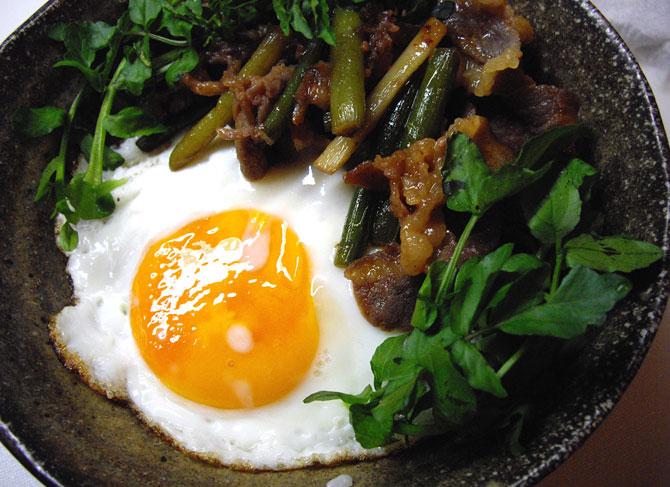 | « Back to article | Print this article |
11 muscle-building rules for skinny guys
Fitness trainer Jivesh Shetty offers nutrition rules that can help skinny folks gain mass.
Rule 1
Remember: If you consume more calories in a day then you burn off, then you will gain weight. Simple!
Food is the most anabolic substance known to man. Anytime you eat a well-balanced, nutritious meal, your body enters into a state of anabolism (muscle building). Anytime your body runs out of food, it goes into a state of catabolism (muscle wasting).
Meal frequency: The more consistent you eat, the longer you will keep your body in a state in which it can optimally build muscle! The more frequently you eat, the more muscle you will gain and the leaner you will be.
High meal frequency allows you to consume smaller meals throughout the day, rather than larger meals in only a few sittings. Your body can absorb smaller meals with a greater proficiency than it can larger ones.
For example a 400 calorie meal can be digested, and used to build muscle much easier than a 800 calorie meal. If a person is bulky and eats six 400 calorie meals, then s/he will get a total of 2,400 calories. If he had however eaten three 800 calorie meals then he would have been more likely to store fat. You see, the more overloaded our digestive system becomes, the more fat we will store.
In addition, as I stated, smaller meals will be absorbed and used with much greater efficiency. The more your body can use the nutrients you feed it, the more muscle you will gain. Every time you eat, your bodies temperature rises and you burn more calories. In other words, it keeps your metabolism extremely high, which can benefit you, by keeping you leaner on a bulk and also burning fat at a much higher rate on a cut.
Rule 2
Water consumption: Your muscles are 70 per cent water and so is your body. This goes to prove that the less you drink, the more likely you are to become over trained. Without proper hydration, you will never see optimal gains. Water lubricates us, keeps us away from injuries, allows our muscles to contract harder, speeds recovery, and is involved with millions of other actions in the body.
The author is Strength & Conditioning Coach, Birla Wellness.
11 muscle-building rules for skinny guys
Rule 3
Protein intake: In order to stimulate muscle growth, you have to shock your muscles with weight resistance. Then, amino acids have to be at hand in order to aid in the tissue repair.
If you don't get enough protein, you can train as hard and intensely as you want, and still not see any growth. You will only end up over training! I recommend a minimum of 1 gram of protein a day per pound of bodyweight for an adult male. If you weigh 150 pounds, you should eat atleast 150 grams a day of this anabolic macro-nutrient!
Rule 4
Carbohydrate intake: One important fact about carbs is that they have a "protein sparing" effect. Which means when your body has enough carbs to fuel itself, it will be able to more fully utilise protein for its real job i.e. the maintenance, repair and growth of muscle tissues. This is why carbs are so vital while trying to gain mass.
Also, eating too few carbohydrates can leave your muscles depleted and flat as carbohydrates also help in drawing in the all-important 'water' into your muscle cells. Muscle fullness depends, to a large extent, on the glycogen stored within them.
Carbohydrates are also chiefly responsible for inducing the release of one of our body's most anabolic hormones, insulin! Insulin literally shuttles amino acids and other vital nutrients into our muscles for growth.
However, insulin is also the chief hormone responsible for fat storage.
Remember: If you have a metabolism that easily stores fat, then try and stay as clean as possible. Eat clean starchy carbs such as sweet potatoes and oatmeal. Also eat fibrous green carbs such as lettuce, spinach, and any other green veggies.
Stay far away from anything that is bleached or processed such as white bread, candy, white rice and other carbs along those lines. Cleaner, fibrous carbs digest slowly and do not induce an overproduction of insulin. Hence, you get a steady even stream of this hormone, reaping the anabolic effects of it, while suppressing the fat storing side of it.
Remember, processed foods usually always induce an overproduction of insulin.
11 muscle-building rules for skinny guys
Rule 5: Up your calories slowly so that your metabolism has time to adapt.
Rule 6: Tried and tested supplementation for the hard training trainee
- Protein (whey, casein, weight gainers)
- Creatine
- Glutamine
- Essential Fatty Acids(EFAs)
- Sports Multi-vitamin
Training rules
Rule 7: The most important training principle to follow is progression.
Our bodies build muscle because of an adaptive response to the environment. When you go to the gym, you break down your muscle fibers by training with weights. When we rest our bodies we recover and adapt by rebuilding the damaged fibers making them larger and stronger in order to protect against any possible future threat. Therefore, in order to make continual gains in muscle size and strength, you must focus on progressing in the gym from week to week.
Lift 'progressively heavier loads'. This will ensure you train and optimally exhaust your muscles which will in turn utilise the nutrients efficiently when given proper rest and nutrition.
Rule 8: Focus more on compound movements (eg: deadlifts, squats, bench press, pull ups, military press) to train more muscles in the shortest time and create a greater anabolic environment for muscle gain (weight gains).
11 muscle-building rules for skinny guys
Rule 9: Sequencing of one's training routine is very essential. This may entail even keeping a detailed log book. Overtraining of any kind needs to be avoided. That means the muscles must be trained only once they have recovered and are neurologically fresh.
Performing too much of endurance and cardiovascular activity for the skinny folks also must avoided. No more than two short sessions (30 minutes each) per week of cardiovascular work needs to be performed
Rule 10: The slower the weight gain, the less likely you will store fat; 1-2 pounds a week would be optimal.
Rule 11: Rest, rest and rest some more. Remember you only recover and gain muscle when you have rested sufficiently.



